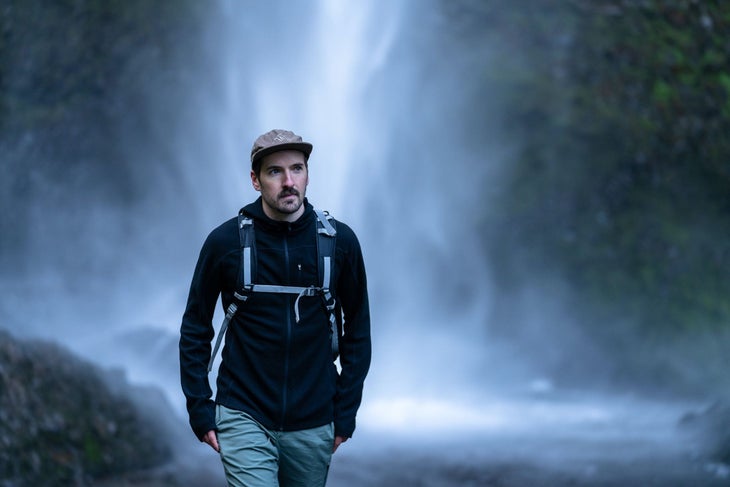Bonie Shupe was sorting through old paperwork recently at her home in Nederland, Colo., when she found a packing slip for three Ibex apparel pieces she won at a 2010 Outdoor Retailer (OR) show.
Over the years, each time Shupe attended OR and strolled the show floor, the outdoor industry veteran would swing by Ibex’s booth to admire the brand’s newest offerings and maybe see about dropping off a resume. Shupe was a longtime fan of merino wool products and an even bigger fan of Ibex, then a Vermont-based apparel brand known as much for its fiercely loyal customers as for its premium clothing and accessories.
At that 2010 OR show, she also dropped a business card in a bowl for a gear giveaway. Who knows, she thought at the time, maybe she’d score some swag or—even better—maybe that card would find its way to the brand’s HR director who would offer her a dream job.
One of those things came true that year. Shupe won the drawing, adding an Ibex puffy jacket, pair of pants, and top to her wardrobe. The other came true almost a decade later. In 2019, Shupe was named general manager and director of product for Ibex, now based in Boulder, Colo., and under new ownership.
“I had followed Ibex for years and had always wanted to work for them,” she told ���ϳԹ��� Business Journal. “This is my dream job. This is something I’ve been working toward for a long, long time.”
But fully understanding how Shupe’s and Ibex’s paths intersected—and where their shared journey leads from here—requires a step back to four years ago when each was in a much different place.

Ibex’s Fall…and Return
Launched in 1997 by John Fernsall, and private equity-backed since 2010, Ibex was celebrating its 20th anniversary in 2017 when the brand made a pivotal business decision about its sales channel strategy. On July 5 of that year, then-CEO Ted Manning told the company that fall 2017 would be the final season of selling product through wholesale channels.
Ibex, he told the employees, was shifting entirely to a direct-to-consumer model in spring 2018, focusing on its e-commerce channel and its flagship retail locations rather than on its wholesale accounts, including specialty outdoor shops.
The move was meant to improve margins, streamline supply chain, and reduce the brand’s carbon footprint. Some retailers lashed out over the decision, but Ibex stood firm. Manning insisted that the maneuver was a savvy business decision and a safeguard for the brand’s future, not merely a short-term cost saving measure.
Unfortunately, the model didn’t work, and the brand didn’t survive past the target date of spring 2018 for the big shift. The rocky transition from a balanced channel strategy of wholesale and direct to strictly DTC initially forced Ibex to lay off half its staff in November 2017. Even deep job cuts, however, didn’t stop the bleeding. Less than a month later, in December 2017, the brand announced it would cease operations the following February.
A few interested buyers emerged, and eventually the brand ended up in the hands of Flour Fund, a New York-based investment group. The buyers announced in March 2018 that they had acquired the intellectual property and remaining assets of Ibex for an undisclosed amount.
“Ibex is a unique brand that has made a name for itself on the quality of the materials its products are made of,” Flour Fund says at the time. “After getting to experience the actual products, it was evident that this is more than just an apparel brand and we understood instantly why a community was formed around it.”
So, the brand lived on—in a slightly different fashion. The question fans had at the time, though, was whether Ibex could keep its company DNA intact. Would consumers continue to support the new version of the business?
It was around that time that Bonie Shupe had her wild idea. She—a longtime customer and superfan—should be the one to lead Ibex into the future.
Resurrecting Ibex
Shupe grew up in Utah, where she became a devotee of Ibex’s merino wool clothing in the early 2000s during her outdoor excursions. She grew to love the items’ washability, their versatility, performance, and perfect mix of fashion and function.
But her relationship with Ibex’s signature material—merino wool—went even deeper than that when she set out to save the company. Shupe had an industry insider’s knowledge of fabrics and fibers. Before coming to Ibex, she spent two decades working as a contract apparel designer and product developer for active lifestyle brands like Cabela’s, Sierra Designs, Ultimate Director, Voormi, Krimson Klover, Spyder, and others.
She admired those brands, but again and again she came back to Ibex because of its quality, aesthetic, and, especially, its commitment to one material.
“I’ve always been obsessed with merino wool—ever since the first pair of merino socks I put on,” she says. “I knew that was always going to be a big focus for me.”
When Ibex shut down and traded hands, Shupe was crushed, but also inspired. If the new owners planned to resuscitate the brand, Shupe figured she—as a fan and a product expert—would be as qualified as anyone to lead the effort.
In March 2019, she flew to New York, interviewed to take over as general manager and director of product, and was soon tasked with relaunching Ibex, which happened in October of that year.
“When I first met the folks at Flour Fund, right away I knew it would be a good move, and they did too,” she says. “They called me the brand’s ‘re-founder.’”
“Ibex 2.0”
The period from relaunch to today has centered on creating what Shupe calls “Ibex 2.0”—her term for the brand’s new 25-person team.
The initial 18 months have been a whirlwind, according to Shupe. The brand’s other superfans—a community that gathers on the private Facebook group Ibex Insiders—quickly came back, buying out products as soon as Ibex listed them on its website.
“The last year and a half have been crazy,” Shupe says. “When we relaunched, we had an idea it would do well, but we didn’t think we were going to sell out of our products. I should have been more aware of the pent-up demand, given the fact that I was a superfan. Ever since then, we’ve been trying to figure out the balance between good small-batch production and meeting our consumer needs.”

Shupe has big ideas for the next phase of Ibex 2.0, and the focus, of course, is creating premium products. Shupe says Ibex is launching a new collection for fall 2021, but that the brand has continued to keep its SKU count well below that of the old version of the company. Ibex has around 40 products available now and plans to keep the count under 100 during the next year. According to Shupe, the old Ibex had around 450 SKUs when it closed.
One thing that hasn’t changed—and won’t change—is the brand’s relentless pursuit of innovation.
“You can expect to see Ibex build back our materials library with washable wool boucle, seamless, and new woolies materials,” Shupe says. “We’re re-thinking Woolaire products and Climawool materials and plan to bring these products back better than ever. We’re also tackling performance-woven wools, which will change the industry.”
Another pillar is its emphasis on sustainability. Ibex is Climate Neutral certified and aims to make its supply chain as transparent as possible.
The company does face some challenges, though. One is operating as a legacy brand—at least in name—while also functioning essentially as a startup. Shupe says balancing those two realities is unique because Ibex 2.0 needs to appease longtime superfans while also creating a new generation of brand evangelists.
“When we relaunched, we did so with just the basics,” Shupe says. “Everyone was so disappointed. There was a lot of backlash. It’s taken some time to get everyone warmed up to the new Ibex. We want to keep the heritage brand alive, but we’re also in a whole new world where we get to bring in new customers as well. One of the things the old Ibex had a hard time with was reaching a younger audience. We’re being a little bit more experimental and playful to open up our audience.”
Retooling Ibex’s Channel Strategy for the Future
The other big challenge facing Ibex is its channel strategy. While Ibex 2.0 has gone the DTC route for the first 18 months of its operations, Shupe says the brand is building a wholesale approach—albeit a much smaller one than what burned the original Ibex four years ago.
“We’re looking to team up with like-minded stores to bring our product to market, so our wholesale channel will focus on small boutique shops,” Shupe says. “When you have wholesale, and consumers can see and feel the textiles, that’s when you’re going to stand apart.”
Ibex has endured a wild ride the last four years—from financial collapse to new ownership to rebirth. The brand doesn’t disclose revenue, but Shupe says Ibex is seeing healthy growth as it ramps up for this next stage.
The Ibex story, and Shupe’s role in it, is still unfolding. But Shupe is proof that career dreams can come true if you have confidence, passion, and a healthy dose of scrappiness. She’s now ready to lead the next chapter, which means bringing the brand’s offerings to as many active and outdoor consumers as possible in a financially sound but sustainable manner.
“We’re on a mission to bring wool to the world,” she says.


